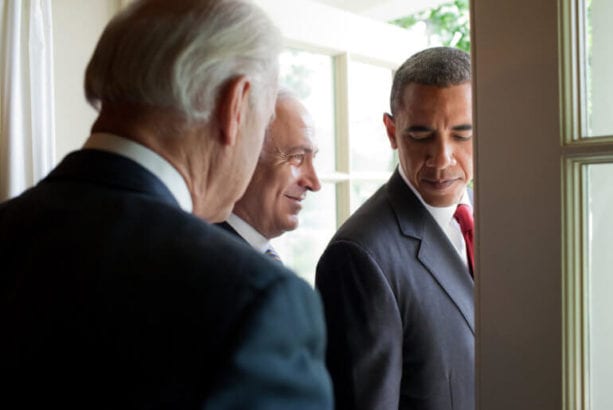President Barack Obama and Vice President Joe Biden talk with Prime Minister Benjamin Netanyahu of Israel as they depart the Cabinet Room of the White House, July 6, 2010. (Official White House Photo by Pete Souza)
Joe Biden has to worry that if he calls for conditioning some of our billions in aid to Israel over annexation (the only reasonable stance) he will send big Jewish donors to the Republican side and alienate Jewish voters in Florida, the biggest swing state prize in November.
By Philip Weiss, reposted from Mondoweiss
The last couple of weeks has seen a very traditional American political ritual: Joe Biden telling the Jewish community how much he loves Israel and can work with Netanyahu. The former VP did so himself in a call-in fundraiser with Jews who advocate for Israel. His aide Tony Blinken did so with a Democratic group that has links to the Israel lobby organization AIPAC.
The purpose of this ritual is clear: Biden needs money to mount a strong challenge to Trump, and the organized Jewish community is regarded as a, very pro-Israel, and b, the largest repository of money in the Democratic Party, the source of half or more of large donations.
Frank descriptions of this process — from the likes of Alan Dershowitz and Ben Rhodes — have been before us for years, but it is rarely addressed in the mainstream media. The truth is simply too uncomfortable, and so when the ritual unfolds, critics say that it is a “canard” that the Jewish community is devoted to Israel, or that this is all about Christian Zionists.
Dems cultivate the Jewish establishment
When the facts are that Democrats cultivate the Jewish establishment on Israel and don’t care what Christian Zionists think, and those Jewish establishment leaders are uniformly right/center on the question, largely reflecting a Jewish community that overwhelmingly supports Israel. Of course, the Republican Party does cultivate Christian Zionists, but Trump apparently did much of his damage in the Middle East to please three Jewish donors.
The reliance on the Jewish establishment explains why Democrats have taken anti-Palestinian positions for decades and today mount feverish efforts to keep the issue from being politicized. You’d think that Democrats would seize any political material they could to use against Trump. Not in this case. It does not matter that a strong majority of Democratic voters and a plurality of all voters support the idea of reducing American aid to Israel over Palestinian human rights violations. The Democratic leadership has rejected that position out of hand, so as not to alienate a special interest.
Hamilton Jordan said 40 years ago that the Israel lobby group AIPAC is so powerful that its influence would overcome any shift in public opinion, and that certainly appears to be the case now, when Democratic politicians try to anathematize the Boycott, Divestment and Sanctions campaign (BDS), though about half of Democratic voters support BDS.
Obama required to call ‘leading Jewish donors’
A plain description of the special interest can be found in “The World As It Is,” the memoir by Obama foreign policy aide Ben Rhodes. In 2011, Obama said that a peace agreement must be based on the ’67 lines, and the roof fell in. Benjamin Netanyahu lectured Obama in the White House, and then the organized Jewish community came down on the president, and Rhodes said he had to call a list of “leading Jewish donors.”
“Netanyahu’s smack at Obama came just as the 2012 presidential campaign cycle was cranking up, and it succeeded in igniting a firestorm of criticism… A number of congressional Democrats distanced themselves from the speech. I was given a list of leading Jewish donors to call to reassure them of Obama’s pro-Israel bona fides. It was far too painful to wade into these waters with no prospect of success. Netanyahu had mastered a kind of leverage: using political pressure within the United States to demoralize any meaningful push for peace just as he used settlements as a means of demoralizing the Palestinians…”
“No prospect of success” — against a rightwing leader, on a rightwing political cause!
Bear in mind that Obama was being forced to eat his promise in Cairo in 2009 that the settlements must end; Obama had lately done Israel’s bidding and vetoed a UN Security Resolution calling for an end to settlements, a great humiliation; but all that was not enough for Netanyahu; there needed to be a renunication of the idea of a viable Palestinian state.
What’s more, many American Jewish leaders privately agreed with Obama on settlements. But when it came to Israel they needed to show solidarity with Netanyahu (as Steve Bayme of the American Jewish Committee explained, a point echoed today by the new CEO of Americans for Peace Now).
It may be the case that most American Jews support two states; but even J Street, the alternative to AIPAC, pulled back on opposing settlements during the Obama administration when party leaders like Debbie Wasserman Schultz and Neera Tanden were siding with Netanyahu– and Tanden’s thinktank landed a major donor by doing so (a liberal humanitarian who is a part-owner of the Celtics).
Truman, Jimmy Carter
Anti-Palestinianism has been a feature of Democratic politics for decades. Truman recognized Israel in part because of donor pressure in the ’48 campaign. In the 60s LBJ abandoned opposition to Israeli nukes in part due to the pressure of a leading fundraiser, Arthur Krim. In 1978, Jimmy Carter sought to pressure Israel to abandon the settlement project so as to allow for Palestinian self-determination, and his top political aide warned him about crossing the “Jewish lobby.” Hamilton Jordan wrote a long memo saying that Carter’s pro-Palestinian stances were alienating AIPAC, which was broadly representative of the Jewish community, and endangering his future at the White House.
Jordan frankly addressed the donor issue: “Out of 125 members of the Democratic National Finance Council, over 70 are Jewish; In 1976, over 60% of the large donors to the Democratic Party were Jewish; Over 60% of the monies raised by Nixon in 1972 was from Jewish contributors; Over 75% of the monies raised in [former VP Hubert] Humphrey’s 1968 campaign was from Jewish contributors; Over 90% of the monies raised by [WA Sen. Henry] Scoop Jackson in the Democratic primaries [in 1976] was from Jewish contributors; In spite of the fact that you were a long shot and came from an area of the country where there is a smaller Jewish community, approximately 35% of our primary funds were from Jewish-supporters.”
Jimmy Carter continued to press Israel on settlements, and lost reelection in 1980 with less than half of the Jewish vote, a record low for a Democrat. Stu Eizenstat, Carter’s aide with ties to the Jewish community, says that Carter attributed his loss of the White House in part to that position. “I believe Carter was left with the view that New York Jews had not only defeated him in the [1980] primary but were also a factor in his loss in November,” Eizenstat wrote in his recent book, “President Carter: The White House Years.”
Steve Bayme of the AJC also did an end-zone dance in a recent webinar: “We rejected President Carter in 1980 because he was seen as not being friendly to Israel– he certainly upped the pressure on Israel considerably– even though he was clearly the more liberal candidate in the 1980 presidential election.”
George Bush Sr
President George H.W. Bush’s one-term presidency provided the same lesson: Don’t take on Israel over settlements. New York Times pundit Tom Friedman explained in 2013:
President Bush the first stood outside the White House one day and said I’m one lonely man standing up against the Israel lobby. What happened as a result of that, is that Republicans post Bush I, and manifested most in his son Bush 2, took a strategic decision, they will never be out pro-Israel’d again. That they believe cost them electorally a lot.
So that pulled the American spectrum to the right, and it created an arms race with the Democrats, over who could be more pro Israel.
We are in the middle of that arms race now. It really is about the Benjamins, just as Rep. Ilhan Omar said a year ago. “In a political system addicted to funds and fundraising, Jews donate as much as 50 percent of the funds raised by Democrats and 25 percent of the funds raised by Republicans,” rightwing Israel supporter Gil Troy wrote in 2016.
‘Jewish money biggest game in town’
J.J. Goldberg of the Forward told a J Street forum on politics that year that Jewish money was the biggest game in town for Democrats. Of the top 14 donors to Democratic candidates, only one was not Jewish, Goldberg said.
You ask a Democratic fundraiser, where do you get the money from? “Well from trial lawyers, from toys, from generic drugs, from Hollywood. From Jews.” Those are all essentially Jewish industries… When you are raising money, you need to find rich people who are not right wing, and there are not– pardon me for saying this, there are not many rich goyim who are not right wing.
Stephanie Schriock of Emily’s List told the same forum that politicians believed they could get to these donors through the pro-settler organization AIPAC. When Schriock worked as a finance director for congressional candidates in the 90s, she went to three pools for money to get a campaign off the ground: labor, pro-choice, and the Jewish community. And to get the Jewish community, she went to AIPAC, Schriock said:
Before you went to the Jewish community, you had a conversation with the lead AIPAC person in your state and they made it clear that you needed a paper on Israel. And so you called all of your friends who already had a paper on Israel – that was designed by AIPAC – and we made that your paper.
This was before there was a campaign manager, or a policy director or a field director because you got to raise money before you do all of that…. I barely knew where Israel was until I looked at a map, and the poor campaign manager would come in, or the policy director, and I’d be like, ‘Here is your paper on Israel. This is our policy. We’ve sent it all over the country because this is how we raise money.’ … This means that these candidates who were farmers, school teachers, or businesswomen, ended up having an Israel position without having any significant conversations with anybody…
Schriock went on to say that our “country had one very clear unmovable set of policies, and it wasn’t driven by voters.” What would happen if a candidate didn’t take the AIPAC position on Israel? “You thought that the money was going to be gone.”
Schriock was speaking to an anti-Netanyahu group, J Street, and saluting it as a breath of fresh air. No doubt J Street changed the map of establishment Jewish politics, to include a liberal Zionist bloc in the Democratic Party. J Street can take credit for the Iran deal and for Joe Biden’s recent statements against Israeli annexation.
Support for military aid must remain bipartisan
But J Street right alongside AIPAC and Alan Dershowitz and Joe Biden and Dianne Feinstein all agree on a hardline position: Israel must never be politicized. Support for military aid must remain bipartisan and uniform.
Joe Biden has to worry that if he calls for conditioning some of our billions in aid to Israel over annexation (the only reasonable stance) he will send big Jewish donors to the Republican side and alienate Jewish voters in Florida, the biggest swing state prize in November.
American Jews are conservative on the issue. Batya Ungar-Sargon of the Forward says 95 percent of the Jewish community is pro-Israel, and she describes a range from AIPAC and ZOA on the right to New Israel Fund on the left. Jews like me who are alienated by Israel are still the fringe, though we are coming inside step by step. Trump knows just what he is doing when he tries to win over rightwing Jews by saying that the Democratic Party is “anti-Israel” — and so does Biden, when he covers his right flank. says that Biden’s stance is crafted for donors.
This is a very old dynamic, 40 years or more. One recent change is that as the lobby comes under criticism, including from Jews, the rightwing has gotten more direct about the power of the lobby.
Alan Dershowitz: ‘We are entitled to use our power’
Here is Alan Dershowitz crowing about Jews using money and influence at a conservative synagogue in Scarsdale 3 years ago:
People write a book called “The Israel Lobby” and complain that AIPAC is one of the most powerful lobbies in Washington. My response to that is, That’s not good enough. We should be the most powerful lobby in Washington….
We are entitled to use our power. We have contributed disproportionately to the success of this country. We have done so much for this country. When you think of how much better this country has become since our grandparents and great grandparents took the risk of coming here, we have not only the right we have the obligation to speak out, and use every… bit of power available in support of Israel.
Dershowitz called for using that economic power against universities when campus activists target Israel with the BDS campaign. Donors need to tell administrators, “If you divest from Israel, we divest from you.” Dershowitz went on:
That has to remain the rule. Anyone that does has to be treated with economic consequences. We have to hit them in the pocketbook. Don’t ever ever be embarrassed about using Jewish power. Jewish power, whether it be intellectual, academic, economic, political– in the interest of justice is the right thing to do.
‘Most influential minority in history of the world’
It’s not just Dersh. Here is centrist Zionist Michael Koplow of the Israel Policy Forum:
Of course AIPAC is influential and powerful; not only is it nonsense to claim otherwise, but being influential and powerful is precisely the point… And AIPAC is not alone in this regard; I have no qualms about pointing out that the American Jewish community is almost certainly the most influential minority community in the history of the U.S., and possibly in the history of the world. American Jews have worked hard to make it so, and have built a network of outward-facing institutions that protect this privileged position. There is nothing dark and nefarious about this, despite the most fervent fever dreams of anti-Semites that Jews are hidden puppet masters.”
‘Jewish editors & writers’
Steven Bayme of the American Jewish Committee says that the pro-Israel influence goes beyond money to the Jewish presence in the establishment. Jewish editors and writers are essential to “Israeli national security.”
When you realize so much of the political discourse in American politics is articulated by Jewish intellectuals, Jewish writers, Jewish editors of magazines, in other words the political culture of America is one in which Jews play an enormous role. Therefore not to understand and appreciate the influence of American Jews politically, culturally and intellectually again is not only hurtful of the concept of peoplehood, of who we are as one people, it’s also hurtful of Israeli national security.
Tom Friedman accepted that mission. “Israel had me at hello,” he told an older Jewish audience last year. “Whatever you think folks– don’t worry. In times of crisis, I know where I will be. When the Jewish state is under threat…”
Bari Weiss of the New York Times also embraces “Jewish power.” Progressives are creating “factions within the Democratic Party that are actively hostile to Jewish power,” she wrote in her 2019 book on antisemitism. Today “the very idea of Jewish power must be abjured. Whereas once Jewish success had to be explained, now it has to be apologized for.”
Appearing at the 92d Street Y, Weiss said the left was “apologizing for Jewish success,” which she linked to Israel.
What the far left is trying to do is strip us of our ability to be victims in any way at all… if you want to be a part of the coalition of the oppressed, you need to publicly disavow any kind of Jewish power at all [such as]… support for Israel, Jewish success…
Because I am such an optimist, I think the politics of Israel and Palestine are changing under our feet. The Jewish rise that Bayme and Weiss and Dershowitz describe, that I was part of when I got out of college– has plateaued.
In the next generation, there will be a diverse establishment, and Jews will no longer be so prominent in it, and those Jews won’t care about Israel nearly as much. In the same speech in which he said Israel had him at hello, Tom Friedman said that he worries about the next generation of Times foreign correspondents, they just don’t care about Israel.
It seems to me just a matter of time before a pro-BDS candidate will be a force to be reckoned with. Today Rep. Ilhan Omar has raised over $3 million to her pro-Israel challenger’s $500,000. The Israel lobby is not the only game in town.
But that is a Minnesota district that has twice elected Muslims to Congress. Politicians deal with very conventional reckonings of reality. They consult the playbook of the last 30 years, and that says that Trump is making an appeal to Democrats who love Israel; those Democrats supply half the party’s warchest; and the Democrats can’t put that special interest in play without putting Biden’s hope of unseating Trump at grave risk. It really is that simple. What a pity the media can’t say so openly.
Philip Weiss is senior editor and founder of Mondoweiss, a news website devoted to covering American foreign policy in the Middle East, chiefly from a progressive Jewish perspective
RELATED READING:
Against Our Better Judgment: The hidden history of how the U.S. was used to create Israel
“Progressive Except Palestine” groups gang up on Bernie Sanders
Democratic leader stacks committee against Bernie (with Israel partisans)
Philip Giraldi: How Jewish Power Sustains the Israel Narrative
Democratic bigwigs create group to promote Israel to progressives
New pro-Israel orgs try to save the Jewish State’s sagging reputation





